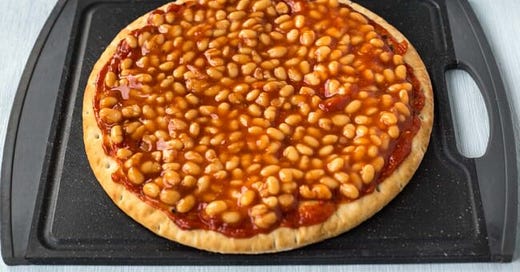If you’re wondering about the title, then I’m referring to this:
School dinner was always something to look forward to. My school used to spoil us with food and the philosophy was “a well fed child is a happy child.” That still applies but the definition of “well fed” has changed and that’s sometimes quite difficult to get across to parents.
I had a difficult consultation recently with a parent about their “overweight” kids. The long and short of it was that the kids were not being fed nutritious meals and were instead having very salty, processed food resulting in high BMIs across all the children (total 3). “Eating healthy is expensive” said the mother and I guess I could relate because it certainly is. However, it was hard for me to get across how important it was to address childhood obesity so I thought I’d do some reading around the subject.
What is childhood obesity?
Childhood obesity is something we certainly need to be concerned about as 1/3rd of all children in the UK are classed as obese. Here are some reasons as to why childhood obesity is rising:
Lack of activity in childhood due to changing play habits e.g. video games
Socio-economic deprivation - a child in a deprived area is 5 times more likely to be obese. A child is also less likely to be involved in physical activity.
Covid-19 - need I say anymore?
Eating habits - a high snack culture involving processed foods makes a child more likely to put on weight.
Whilst some of these factors are certainly structural, we should be aware of the extent of the problem faced by children. Here are some helpful facts about spotting childhood obesity:
Overweight children is defined as BMI ≥91st centile.
Obesity is defined as BMI ≥98th centile.
Obesity in childhood sets a child up for several problems including:
These are quite problematic outcomes and as clinicians, it is helpful if we can identify childhood obesity early and help intervene. As clinicians, we’ve either been trained in motivational interviewing or have been subject to such techniques ourselves so we can appreciate how difficult making dietary changes can be. A useful paper by JJ Reilly (2006) shares some of these strategies which I found quite refreshing:
Be direct and state the problem. This demonstrates the seriousness of the issue to the patient and their family
Don’t be afraid to have longer appointments
Treat the whole family, not just the child
Only treat motivated families. You will gauge this quite quickly and the evidence base unsurprisingly shows the lack of value in counselling patients who are not motivated to change.
Aim for dietary changes using simple references. Reilly (2006) suggests the traffic light system which can be referred to here.
And those are some insights into childhood obesity and how we can help reverse the rise. We want children to have a positive start in life which includes health as well as educational opportunities.
Until next time…
Our Upcoming Schedule
Christmas is coming and the holiday mood is quickly settling in but keep an eye out for what we’ve got planned at the turn of the year.
If you’re a student due to sit your national exams or a qualified clinician looking for a comprehensive knowledge update the consider signing up to our online Written Masterclass! It’s a day of learning including lectures, summary tables, clinical guidance and more! This is all available from the comfort of your own home for a small price of £30!
Don’t miss out and book now!
Check us out on our various pages:
Website: www.paretoeducation.co.uk
Instagram: https://tdy.lol/lQSxv
TikTok: https://tdy.lol/AJdzQ
YouTube: https://tdy.lol/ZEoOt
Newsletter: https://tdy.lol/WnTBR
LinkedIn: https://tdy.lol/efLOB






